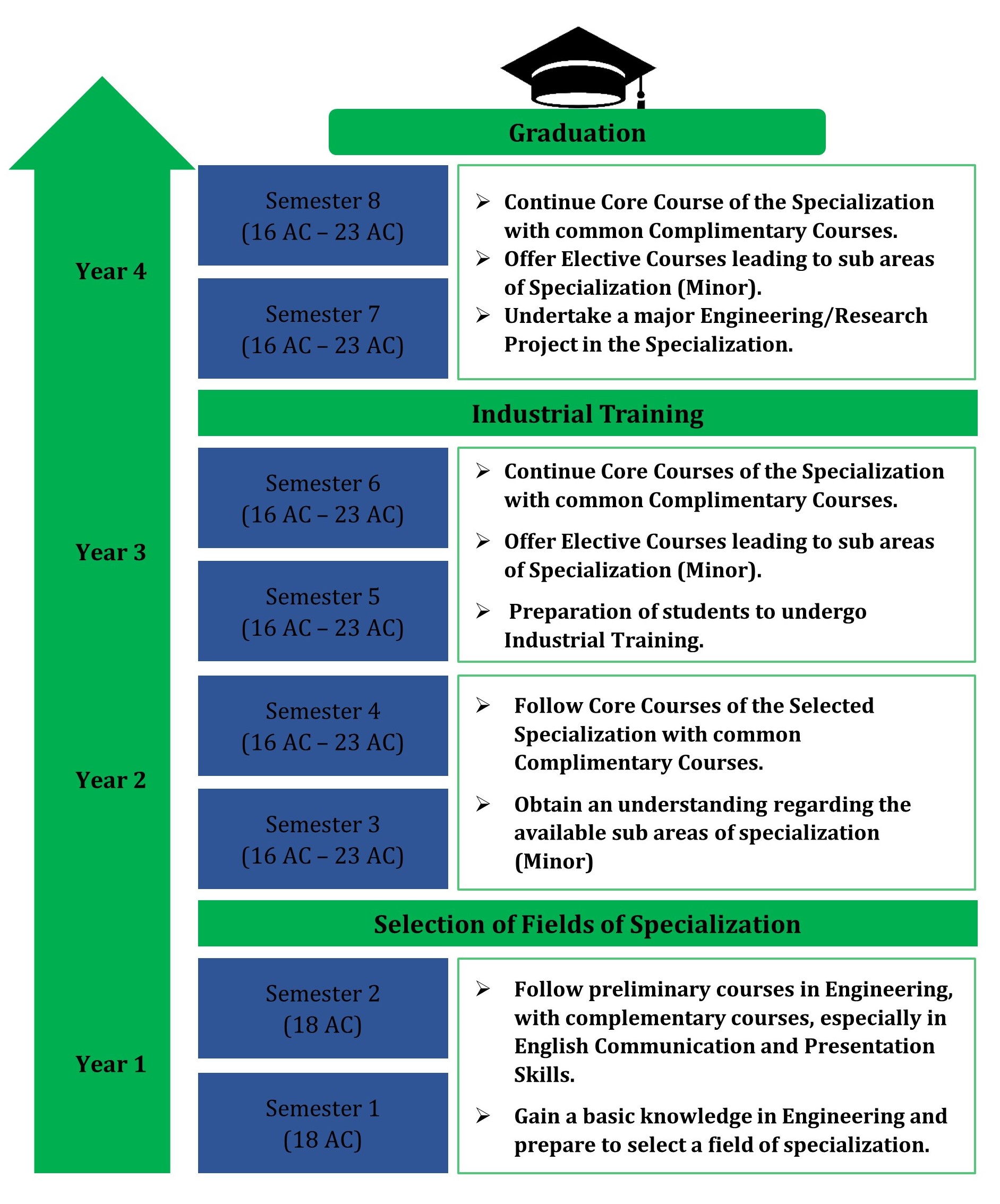The objective of the programme is to produce engineering graduates who have the knowledge and the aspiration to become competent engineers in a wide range of emerging specializations in mechanical engineering. This is facilitated by offering a curriculum which has the flexibility to meet the current and emerging needs of the country and the profession, as acceptable to the global community.
Our mission is to nurture future leaders in mechanical engineering who can provide creative and innovative solutions to global challenges by drawing inspirations from our indigenous knowledge and wisdom. The department pursues to become the benchmark for mechanical engineering education, innovation, and research in the region.
It is envisaged that a graduate of the Faculty will have acquired a number of generic attributes enabling him to be adequately prepared to enter the engineering profession and practice as an Engineer. These attributes have been developed in keeping with the “IESL Engineering Programme Accreditation Manual” of March 2014 (based on the requirements of the Washington Accord).
The attributes required of an engineering graduate are, to;
• Apply knowledge of mathematics, basic sciences, and engineering fundamentals to the analysis of complex engineering problems.
• Identify, formulate, research literature, conduct investigations and solve complex engineering problems to provide valid conclusions.
• Design systems, components or processes that meet specified needs.
• Conduct investigations of complex problems using research-based knowledge and research methods.
• Create, select, and apply appropriate techniques, resources, and modern engineering and IT tools to complex engineering activities.
• Assess societal, health, safety, legal, cultural, and environmental issues related to professional engineering solutions.
• Demonstrate broad knowledge of sustainable development concepts and practices required for dealing with contemporary issues related to professional engineering practice.
• Demonstrate broad knowledge of ethical responsibilities and professional standards.
• Demonstrate ability to function effectively as an individual and in multidisciplinary and multicultural teams, with the capacity to be a leader or manager as well as an effective team member.
• Communicate effectively on complex engineering activities with the engineering community and with society at large, such as being able to comprehend and write effective reports and design documentation, make effective presentations, and give and receive clear instructions.
• Demonstrate broad knowledge of management and business practices, including financial management, risk and change management.
• Engage in independent and lifelong learning in the broad context of technological change.
The upward mobility of a student after gaining admission to the Faculty is depicted in the following diagram.

Manufacturing Engineering focuses on the design and operation of integrated systems for the production of high-quality, economically competitive products. A specialist in manufacturing engineering might be hired to: automate a manufacturing facility through computer integrated technology, to optimize the manufacturing processes to reduce costs and improve product quality, to develop the task breakdown to get the best assignment of machines and equipment, and to identify the most cost-effective material handling and facility layout alternative for a manufacturing company.
The minor in Manufacturing Engineering covers the areas of;
Engineers specialized in Building services design, install and maintain cost-effective and energy-efficient systems for building services such as water, lighting, heating, ventilating, air conditioning, lifts, and firefighting installations. They are responsible for ensuring that the electrical, mechanical, and plumbing aspects of new buildings perform effectively and efficiently. As such, the job of a building service engineer may include tasks such as: designing or maintaining air conditioning, elevators and other mechanical systems, distributing electricity, water supply and providing lighting & heating.
The minor in Building Service Engineering covers the areas of;
Mechatronics is a multidisciplinary field that combines several types of engineering (electrical and electronic, computer, and mechanical) and refers to the skill set needed in the contemporary, advanced automated manufacturing industry. Mechatronics experts create simpler, smarter systems and are an essential foundation for the expected growth in automation and manufacturing in Sri Lanka and the world. Graduates with Mechatronics engineering knowledge will be at the forefront of rapidly transforming technologies, and work to design and create control systems, robots, innovative machines, and products that make people’s lives easier and their work more efficient. They will be able to revolutionize industries like agriculture, farming, mining and transport by developing automated systems that improve reliability and increase productivity.
The minor in Mechatronics Engineering covers the areas of;